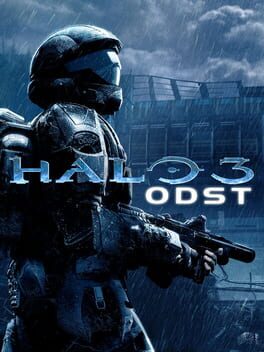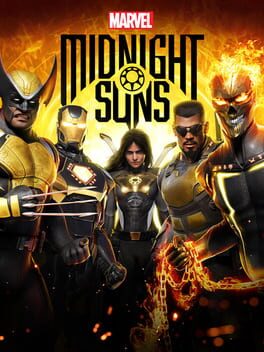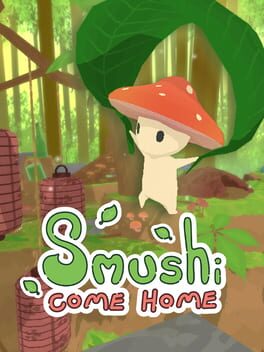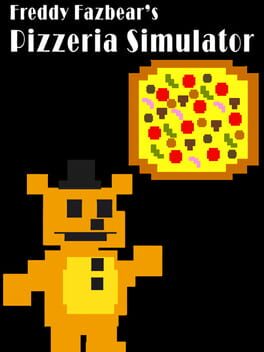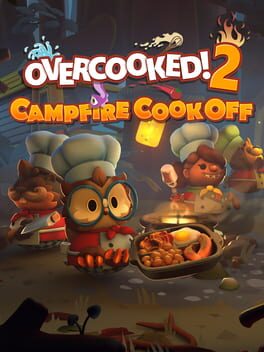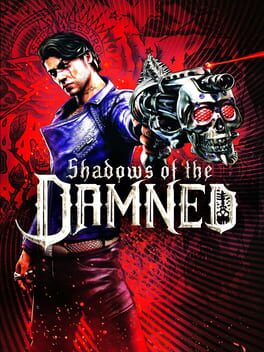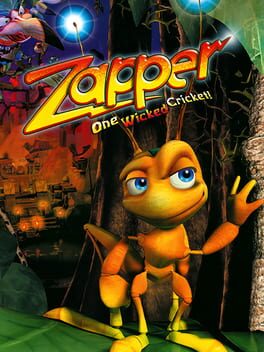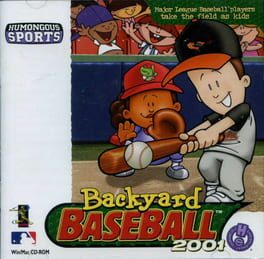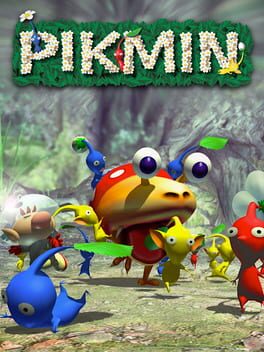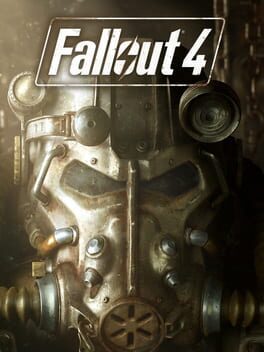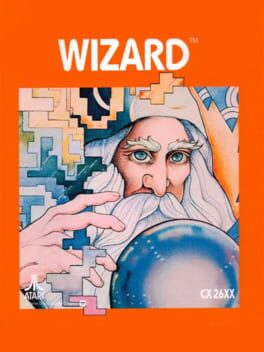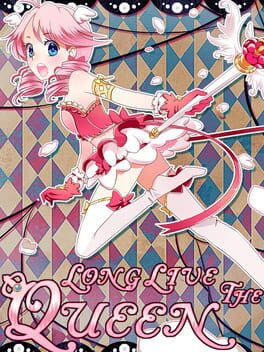Kepler22b
430 Reviews liked by Kepler22b
Halo 3: ODST
2009
*Played as part of the Master Chief Collection
A nice change of pace from the other games in the franchise. I liked the focus on a different group of characters, and the change of pace in the gameplay. That being said, it's a little too generic and the characters are too one-note to truly stand out.
It was fun to play, but I don't think I'll be thinking about this one for a long time to come.
A nice change of pace from the other games in the franchise. I liked the focus on a different group of characters, and the change of pace in the gameplay. That being said, it's a little too generic and the characters are too one-note to truly stand out.
It was fun to play, but I don't think I'll be thinking about this one for a long time to come.
THIS GAME IS A HUGE FAILURE AND IT'S THE PUBLISHER'S FAULT ADVERTISING IT WRONG. IT IS NOT MARVEL XCOM. IT IS NOT THAT CRINGE. OK IT KIND OF IS BUT LIKE GROW A PAIR YOU BIG BABY YOU'RE MISSING OUT ON GREAT CARD BATTLER / STRATEGY MOVEMENT GAME. MARVEL IS TIRED BUT THIS GAME WIRED.
This game is fucking awesome when it gets down to the battles. It's balanced perfectly. I grinded out for the harder difficulties because I was ready to sweat after the first couple levels. Firaxis knows how to make pulse pounding turn based action. They really are at their best here making compelling, fun systems and dynamic enough difficulty settings that are easy enough for every kind of person jump into -- but you can get your ass kicked, too if you really really want to.
You can make custom comic book photos of your squad after ever mission. There's a mini overworld with some minor distractions in there. It's aight, you gotta participate in it to get all the extra challenges and stuff.
I love this game. I think it was probably a great idea when it was pitched, but when it released people were DONE with Marvel shit. So a game that goes with that Kevin Feige approved dialogue will just remind you of that stagnation with the movies. To be real, this game does Captain Marvel the best. The Runaways get a fair amount of love. Every character is fun to play. It is just a shame that Disney penis'd Marvel and made everyone sick of Marvel. Midnight Suns was one of the biggest victims of the penising. Aw well, you can buy this bad boy for like 20 bucks and it's super worth it.
Penis.
This game is fucking awesome when it gets down to the battles. It's balanced perfectly. I grinded out for the harder difficulties because I was ready to sweat after the first couple levels. Firaxis knows how to make pulse pounding turn based action. They really are at their best here making compelling, fun systems and dynamic enough difficulty settings that are easy enough for every kind of person jump into -- but you can get your ass kicked, too if you really really want to.
You can make custom comic book photos of your squad after ever mission. There's a mini overworld with some minor distractions in there. It's aight, you gotta participate in it to get all the extra challenges and stuff.
I love this game. I think it was probably a great idea when it was pitched, but when it released people were DONE with Marvel shit. So a game that goes with that Kevin Feige approved dialogue will just remind you of that stagnation with the movies. To be real, this game does Captain Marvel the best. The Runaways get a fair amount of love. Every character is fun to play. It is just a shame that Disney penis'd Marvel and made everyone sick of Marvel. Midnight Suns was one of the biggest victims of the penising. Aw well, you can buy this bad boy for like 20 bucks and it's super worth it.
Penis.
Smushi Come Home
2023
It's really hard not to compare Smushi Come Home to A Short Hike, given how similar the progression and fly mechanics are. I think those influences are well applied, at least in the gameplay side, with how easily the game flows and how satisfying it is albeit simple. But what made A Short Hike memorable were its characters, that either mirrored real life problems or were simply fun to interact with, accompanied by the game's inspirational message that was delivered subtly throughout its course and culminating in the ending. All of this adding to its emotional impact, and in a way, at least for me, justifying the childish vibe. That's all pretty much missing here, with characters having really generic dialogues, and the game's message essentially being "family sticks together" delivered in the most trivial way possible. So you're left with a cute game, but with no substance whatsoever. Even if it's harsh, it's hard to not consider this a little immature. Specially considering how overall childlike it is, but the gameplay not being fit for a child to play (I think? Unless child gamers are much better now than I once was as a child.)
Anyway, I was getting unintentionally dark with my games lately, so I wanted to detox by playing this, and I think it did that job just fine. Even if it's not perfect it is relaxing and decently fun, so maybe if you're into the wholesome-core games you can't go wrong with this one.
(I did call the game immature, but I admit to playing it because of the huge capybaras in the game's backloggd background. So take that as you will.)
Anyway, I was getting unintentionally dark with my games lately, so I wanted to detox by playing this, and I think it did that job just fine. Even if it's not perfect it is relaxing and decently fun, so maybe if you're into the wholesome-core games you can't go wrong with this one.
(I did call the game immature, but I admit to playing it because of the huge capybaras in the game's backloggd background. So take that as you will.)
Helldivers 2
2024
PART 1: OK, MAYBE I HATE COMPETITIVE TEAM GAMES
Before I start this review, I want to use this Part to yap for a bit, so if you are not interested in it, just skip to Part 2! Where I’ll actually start talking about my actual experience with the game.
Around 4 years ago, when I quit playing League of Legends I kept seeking another competitive team game that would tick the same boxes for me, but every game I would try one out I would either end up disliking them or not taking them seriously enough to actually consider them my “main game”. Which would result in me dropping them, and moving on to the next shiny thing, but what they all had in common is that I disliked playing with other people, League left this mental scar on me where now I think every random player I meet online is one mistake away, whether it's from me or them, from flaming the fuck out of me. This happened with Paladins, Apex, Overwatch, Dead by Daylight, Hell, it even happened to me in the Versus mode of Left 4 Dead 2, where stakes couldn't possibly be lower.
Eventually, I started gaslighting myself into thinking that all Multiplayer games fucking sucked now, and the constant tryhard mindset was to blame for it. Of course, there are clear exceptions, like Splatoon or competitive games where it's just 1vs1 where I can blame either myself for my mistakes or my opponent for doing something I didn’t know how to play around.
During the same time I stopped playing League, I was getting deep into Final Fantasy XIV, while I have plenty of things to say about it, I’ll save them for whenever I review it in the future. The point is that when I started participating in endgame content, which is for the most part, PVE Focused, I found myself having that same fun I was looking for in multiplayer games that I had been seeking for a long time. The joy of sharing a clear with your team and cheering and being way more patient with each other, went far beyond than just being relieved of having ended a stressful match that was barely won.
This is something I also noticed while playing Souls games, Left 4 Dead 2 co-op campaigns, Phasmophobia or Lethal Company with my friends, and when I recently got into Helldivers 2, I was completely aware of this epiphany by now. Multiplayer games don’t actually suck, competitive team ones do, and it's now a new age for me, where I will use this realization to get into games I’ve never thought were for me, hell, maybe I’ll actually try getting into Monster Hunter despite my initial reluctance towards those series.
Now, let’s have a nice cup of Liber-tea over Helldivers 2.
PART 2: DEMOCRACY MANIFEST
When Helldivers 2 gameplay was first revealed I remember two key things about it, one of my friends was excited about it because it was a wild glow up from its predecessor, and it had this footage where the people playing it had one of those cringey scripted voice chat interactions. But for some reason I cannot find it on YouTube, I swear it happened at The Game Awards, but I’m starting to think it's my own case of Mandela Effect.
However, things started changing once the game actually dropped, and it seemed like its growth in popularity happened overnight. The next thing I learn, the game is having so many people trying to play it that the servers cannot keep up. This is something unprecedented, and it actually prompted me to take a look, what was going on over there that had everyone so fired up? And so I started checking out some streams, it’s a 4 player co-op third-person shooter where you can fight either Bugs or Robots. On the surface, I thought it was nothing special, then I caught a glimpse of the players using the in game Stratagems and throwing them around, making things blow up and causing as much collateral damage as possible, my interest was starting to get piqued, who doesn't like to cause a big explosion? But the biggest thing to accompany all of it, was the Galactic War system with its Major Orders, where every couple of days every player in the game is tasked with working towards a common goal to be rewarded with currencies and sometimes new purchasable weapons. Apparently, this is led by a guy called Joel over at Arrowhead that acts like a real-time DM and sends out the orders depending on what the players were doing.
But what really, REALLY convinced me that I had to buy the game, was the Malevelon Creek arc, where the community tragically lost control of this particular planet to Automatons, it was a massacre, tons of brave Helldivers and Super Citizens were slaughtered in the process, but the playerbase wouldn't stand by it, and vengeance was sworn on that day. It wasn’t until the Major Order to take it back was given where the players valiantly fought in the name of DEMOCRACY to bring it back to our side, and it was done at a speed that neither devs nor players could have even predicted.
This is something I had to take part of, there was one issue, however. At the time I was busy playing other games, so despite buying it, it wasn’t until recent weeks that I started playing it a lot more, it is one of my biggest regrets to not have been part of this when player counts still soared over 500k every day, but it still warms my heart to log in and see over 100k still playing actively. One of my most common fears with live service games is that at any moment where failure starts to be shown, it's only a matter of time when the publisher says it's time to turn the lights off, and all that time invested gets flushed down the toilet (RIP Knockout City and Rumbleverse, I still think about you two now and then), but Helldivers 2 seems like its here to stay, and I’m happy to be a part of it, to be spreading justice and freedom for as much as I can. To hopefully one day participate in a Major Order as iconic as The Battle for Malevelon Creek
If there's something I had to complain about the game is how some types of enemies are extremely obnoxious to fight against (I fucking despise Chargers and Hulks), and that Arrowhead has a weird philosophy when it comes to weapon balancing, I don't consider myself an expert in game design, but at the end of the day, this is still a PvE game, one that can become really fucking tough at times, if anything I think everything should be busted, so there’s no meta to be enforced by whatever toxic players might be out there and everyone can play their own way.
To wrap things up, on top of my brief rant about Competitive Team Games, there’s another type of game I dislike a lot nowadays and that’s not a controversial opinion, we are all tired of Live Services, games that don’t respect their customers and that think we all have unlimited time, games where just playing them isn’t enough. Gone are the 7th gen days when games would drop with a weirdly, yet charmingly designed Multiplayer mode whose servers barely worked in favor of rotating shops and time-limited Season Passes that unlock only fluff most of the time. Make no mistake, Helldivers 2 also has some of these tropes, but it appears that this time it remembered it still has a box price, so what would be the point of time gating battle passes and having absurdly expensive cosmetics? None, get all of that shit by playing, go out there, kill some bugs and bots, get that rising feeling of power when your Helldiver starts maniacally laughing because you kept firing for a full mag. Drink of the cup of Liber-tea.
Before I start this review, I want to use this Part to yap for a bit, so if you are not interested in it, just skip to Part 2! Where I’ll actually start talking about my actual experience with the game.
Around 4 years ago, when I quit playing League of Legends I kept seeking another competitive team game that would tick the same boxes for me, but every game I would try one out I would either end up disliking them or not taking them seriously enough to actually consider them my “main game”. Which would result in me dropping them, and moving on to the next shiny thing, but what they all had in common is that I disliked playing with other people, League left this mental scar on me where now I think every random player I meet online is one mistake away, whether it's from me or them, from flaming the fuck out of me. This happened with Paladins, Apex, Overwatch, Dead by Daylight, Hell, it even happened to me in the Versus mode of Left 4 Dead 2, where stakes couldn't possibly be lower.
Eventually, I started gaslighting myself into thinking that all Multiplayer games fucking sucked now, and the constant tryhard mindset was to blame for it. Of course, there are clear exceptions, like Splatoon or competitive games where it's just 1vs1 where I can blame either myself for my mistakes or my opponent for doing something I didn’t know how to play around.
During the same time I stopped playing League, I was getting deep into Final Fantasy XIV, while I have plenty of things to say about it, I’ll save them for whenever I review it in the future. The point is that when I started participating in endgame content, which is for the most part, PVE Focused, I found myself having that same fun I was looking for in multiplayer games that I had been seeking for a long time. The joy of sharing a clear with your team and cheering and being way more patient with each other, went far beyond than just being relieved of having ended a stressful match that was barely won.
This is something I also noticed while playing Souls games, Left 4 Dead 2 co-op campaigns, Phasmophobia or Lethal Company with my friends, and when I recently got into Helldivers 2, I was completely aware of this epiphany by now. Multiplayer games don’t actually suck, competitive team ones do, and it's now a new age for me, where I will use this realization to get into games I’ve never thought were for me, hell, maybe I’ll actually try getting into Monster Hunter despite my initial reluctance towards those series.
Now, let’s have a nice cup of Liber-tea over Helldivers 2.
PART 2: DEMOCRACY MANIFEST
When Helldivers 2 gameplay was first revealed I remember two key things about it, one of my friends was excited about it because it was a wild glow up from its predecessor, and it had this footage where the people playing it had one of those cringey scripted voice chat interactions. But for some reason I cannot find it on YouTube, I swear it happened at The Game Awards, but I’m starting to think it's my own case of Mandela Effect.
However, things started changing once the game actually dropped, and it seemed like its growth in popularity happened overnight. The next thing I learn, the game is having so many people trying to play it that the servers cannot keep up. This is something unprecedented, and it actually prompted me to take a look, what was going on over there that had everyone so fired up? And so I started checking out some streams, it’s a 4 player co-op third-person shooter where you can fight either Bugs or Robots. On the surface, I thought it was nothing special, then I caught a glimpse of the players using the in game Stratagems and throwing them around, making things blow up and causing as much collateral damage as possible, my interest was starting to get piqued, who doesn't like to cause a big explosion? But the biggest thing to accompany all of it, was the Galactic War system with its Major Orders, where every couple of days every player in the game is tasked with working towards a common goal to be rewarded with currencies and sometimes new purchasable weapons. Apparently, this is led by a guy called Joel over at Arrowhead that acts like a real-time DM and sends out the orders depending on what the players were doing.
But what really, REALLY convinced me that I had to buy the game, was the Malevelon Creek arc, where the community tragically lost control of this particular planet to Automatons, it was a massacre, tons of brave Helldivers and Super Citizens were slaughtered in the process, but the playerbase wouldn't stand by it, and vengeance was sworn on that day. It wasn’t until the Major Order to take it back was given where the players valiantly fought in the name of DEMOCRACY to bring it back to our side, and it was done at a speed that neither devs nor players could have even predicted.
This is something I had to take part of, there was one issue, however. At the time I was busy playing other games, so despite buying it, it wasn’t until recent weeks that I started playing it a lot more, it is one of my biggest regrets to not have been part of this when player counts still soared over 500k every day, but it still warms my heart to log in and see over 100k still playing actively. One of my most common fears with live service games is that at any moment where failure starts to be shown, it's only a matter of time when the publisher says it's time to turn the lights off, and all that time invested gets flushed down the toilet (RIP Knockout City and Rumbleverse, I still think about you two now and then), but Helldivers 2 seems like its here to stay, and I’m happy to be a part of it, to be spreading justice and freedom for as much as I can. To hopefully one day participate in a Major Order as iconic as The Battle for Malevelon Creek
If there's something I had to complain about the game is how some types of enemies are extremely obnoxious to fight against (I fucking despise Chargers and Hulks), and that Arrowhead has a weird philosophy when it comes to weapon balancing, I don't consider myself an expert in game design, but at the end of the day, this is still a PvE game, one that can become really fucking tough at times, if anything I think everything should be busted, so there’s no meta to be enforced by whatever toxic players might be out there and everyone can play their own way.
To wrap things up, on top of my brief rant about Competitive Team Games, there’s another type of game I dislike a lot nowadays and that’s not a controversial opinion, we are all tired of Live Services, games that don’t respect their customers and that think we all have unlimited time, games where just playing them isn’t enough. Gone are the 7th gen days when games would drop with a weirdly, yet charmingly designed Multiplayer mode whose servers barely worked in favor of rotating shops and time-limited Season Passes that unlock only fluff most of the time. Make no mistake, Helldivers 2 also has some of these tropes, but it appears that this time it remembered it still has a box price, so what would be the point of time gating battle passes and having absurdly expensive cosmetics? None, get all of that shit by playing, go out there, kill some bugs and bots, get that rising feeling of power when your Helldiver starts maniacally laughing because you kept firing for a full mag. Drink of the cup of Liber-tea.
To Hell and Back
Continuing with my own little study on Grasshopper titles, I would inevitably have to come across Shadows of The Damned one way or another. Check out my review on Killer is Dead for a little more insight into Grasshopper works during for what it seems to be, their darkest era. Creatively speaking, at least.
This is again, another case of the 7th gen taking reings on a production with a widly different approach as pitched by Suda51 himself originally. It was a project called Kurayami which in japanese stands for "darkness". Long story short, Kurayami was quietly canceled somewhere around 2009, before the real production of Shadows of the Damned started to pick up steam. It never came to a full-time production, nor passed the prototype phase. Only some photos covering the artwork and ideas were shared to magazine. The remainings were spread alongside other Suda's projects such as Black Knight Sword, Shadows of the Damned and Kurayami Dance which is a manga written by Suda himself.
The story is fairly simple. Our man Garcia Hotspur enter into the depths of hell to save "his" girlfriend Paula, kidnapped by the demon lord: Flemmin (had to look that up, I totally forgot his name). And...yeah that's pretty much it, it is a long journey through a hell citadel looking oddly similar to an eastern european village infrested by demons. The story doesn't take a big role, unlike in other major Grasshopper titles. Instead, what shines through is the creative map design, puzzles, atmosphere and a somewhat fun combat.
Mikami's output into this game design is palpable. If you ever played Resident Evil 4, you'll feel at home, as it is mostly the same philosophy to make the levels dynamic and not boring at the long run. First, introduce a new mechanic with a simple enough puzzle to solve. Second, make sections more difficult and challenging. The last piece is to interwine it with other previously known mechanics, and going from there add extra twists on top. While the combat isn't anything to write home about, the level design carries this games over and over again with secrets, puzzles and fun monsters to shoot at. This is Shadows of the Damned biggest strength, constantly toying with it's ideas, giving them new purposes most of the time and being able to keep it fresh for a long period of time.
On the other hand, for presentation Akira Yamoka plays the role as the main composer. Credits say "Music by" which makes me believe he was in charge of the whole soundtrack. Somber, comfortably dark and atmospheric as always. Here, this is the main menu song which I quite like honestly. Oh boy, this is presentation we're talking about in a 7th gen console game, made no less in Unreal Engine 3 were everything is shiny and wet, for some reason. Look at this shiny grass from Sonic Unleashed to see what I mean. On PS3 I encountered several technical problems, from the very expected screen tearing, incredible input lag and long loading screens to the outright weird not having collision all through a level since it didn't trigger a cutscene during one of the many instances were it automatically saved but freezed the entire game for 30 seconds or more. It was Grasshopper first time using Unreal Engine at the time, and it definitely shows.
EA's hand were lurking all the way into production with Shadows of the Damned. The scenario as Suda said in one of many interviews was written at least 4 times in total, until EA greenlight the project to go until full production. "We want guns, we want dick jokes, we want this, and that..and that". A common ground with the team given the situation they were in was found at last and the project started sailing smoothly, or at least better than meetings that as Suda described, felt like interrogations. Can you imagine that? I've covered many cases which this has hapenned in the past, EA should've known who they were dealing with in the first place. They didn't knew what they were getting into probably, I don't think they ever wanted to sabotage Suda's project on purpose. That would be a bit dumb, but it's EA we're talking about. The EA that killed Visceral Entertainment, the one that shutdown Pandemic Studios. Now that I think about it, isn't it something similar that it is hapenning right now? In a few years, only some will remember. If this review or site are still up that is.
To Hell and Back as described by The Cambridge Dictionary means: "to live through an extremely unpleasant, difficult, or painful experience". I think that title serves well for what this project development was, ultimately giving it redemption in "Travis Strikes Back". This makes me to believe Suda, after all the hell he went through with EA found a soft spot for Shadows of the Damned and rather than ignoring it as a thing of the past he embraces it as one of a life experience that hopefully will not be replicated. You can learn a thing or two from bad experiences, cases may vary a lot but this example serves as a reminder that you need to kill the past to live in peace with your future. Suda probably had this realisation, and started working on the remaster which hopefully will come out soon. He even delayed some projects to make some space, such as a flower, sun and rain remastered which has been rumoured for a long time.
Continuing with my own little study on Grasshopper titles, I would inevitably have to come across Shadows of The Damned one way or another. Check out my review on Killer is Dead for a little more insight into Grasshopper works during for what it seems to be, their darkest era. Creatively speaking, at least.
This is again, another case of the 7th gen taking reings on a production with a widly different approach as pitched by Suda51 himself originally. It was a project called Kurayami which in japanese stands for "darkness". Long story short, Kurayami was quietly canceled somewhere around 2009, before the real production of Shadows of the Damned started to pick up steam. It never came to a full-time production, nor passed the prototype phase. Only some photos covering the artwork and ideas were shared to magazine. The remainings were spread alongside other Suda's projects such as Black Knight Sword, Shadows of the Damned and Kurayami Dance which is a manga written by Suda himself.
The story is fairly simple. Our man Garcia Hotspur enter into the depths of hell to save "his" girlfriend Paula, kidnapped by the demon lord: Flemmin (had to look that up, I totally forgot his name). And...yeah that's pretty much it, it is a long journey through a hell citadel looking oddly similar to an eastern european village infrested by demons. The story doesn't take a big role, unlike in other major Grasshopper titles. Instead, what shines through is the creative map design, puzzles, atmosphere and a somewhat fun combat.
Mikami's output into this game design is palpable. If you ever played Resident Evil 4, you'll feel at home, as it is mostly the same philosophy to make the levels dynamic and not boring at the long run. First, introduce a new mechanic with a simple enough puzzle to solve. Second, make sections more difficult and challenging. The last piece is to interwine it with other previously known mechanics, and going from there add extra twists on top. While the combat isn't anything to write home about, the level design carries this games over and over again with secrets, puzzles and fun monsters to shoot at. This is Shadows of the Damned biggest strength, constantly toying with it's ideas, giving them new purposes most of the time and being able to keep it fresh for a long period of time.
On the other hand, for presentation Akira Yamoka plays the role as the main composer. Credits say "Music by" which makes me believe he was in charge of the whole soundtrack. Somber, comfortably dark and atmospheric as always. Here, this is the main menu song which I quite like honestly. Oh boy, this is presentation we're talking about in a 7th gen console game, made no less in Unreal Engine 3 were everything is shiny and wet, for some reason. Look at this shiny grass from Sonic Unleashed to see what I mean. On PS3 I encountered several technical problems, from the very expected screen tearing, incredible input lag and long loading screens to the outright weird not having collision all through a level since it didn't trigger a cutscene during one of the many instances were it automatically saved but freezed the entire game for 30 seconds or more. It was Grasshopper first time using Unreal Engine at the time, and it definitely shows.
EA's hand were lurking all the way into production with Shadows of the Damned. The scenario as Suda said in one of many interviews was written at least 4 times in total, until EA greenlight the project to go until full production. "We want guns, we want dick jokes, we want this, and that..and that". A common ground with the team given the situation they were in was found at last and the project started sailing smoothly, or at least better than meetings that as Suda described, felt like interrogations. Can you imagine that? I've covered many cases which this has hapenned in the past, EA should've known who they were dealing with in the first place. They didn't knew what they were getting into probably, I don't think they ever wanted to sabotage Suda's project on purpose. That would be a bit dumb, but it's EA we're talking about. The EA that killed Visceral Entertainment, the one that shutdown Pandemic Studios. Now that I think about it, isn't it something similar that it is hapenning right now? In a few years, only some will remember. If this review or site are still up that is.
To Hell and Back as described by The Cambridge Dictionary means: "to live through an extremely unpleasant, difficult, or painful experience". I think that title serves well for what this project development was, ultimately giving it redemption in "Travis Strikes Back". This makes me to believe Suda, after all the hell he went through with EA found a soft spot for Shadows of the Damned and rather than ignoring it as a thing of the past he embraces it as one of a life experience that hopefully will not be replicated. You can learn a thing or two from bad experiences, cases may vary a lot but this example serves as a reminder that you need to kill the past to live in peace with your future. Suda probably had this realisation, and started working on the remaster which hopefully will come out soon. He even delayed some projects to make some space, such as a flower, sun and rain remastered which has been rumoured for a long time.
Been wanting to replay this and realized they released this shit on Steam and GOG earlier this year, so of course I had to cop it. Had this game as a kid (and i still have the physical CD!) and I loved playing it (even though I think I only played the first couple levels mainly). Still love playing it! This type of Frogger game play (they call it "avoid-em-up" in the Steam description lol) is awesome and I wish more fucking games did it!!! Love the level themes, the vibes, the music; all dope.
Pikmin
2001
It was fun to experience the first entry in the beloved Pikmin series! It's easy to tell that the first game was experimental, as many ideas weren't completely fleshed out yet and mechanics could be pretty janky. Others have talked about these points ad nauseam, so I'm going to focus more on the experience.
I really enjoyed the atmosphere. Compared to the later games, Pikmin 1 has an incredible sense of loneliness. You're trapped on an alien planet with a limited time to escape before you asphyxiate, and you're forced to place your trust in a hive mind species to survive. It's a great hook for a minimal story! Most of the dialog is revealed through daily logs and ship parts, which adds to the mystery surrounding Pikmin 1. Who is Olimar, why is he here, why do the pikmin help him etc etc.
When you finally get all the ship parts to return home, Olimar seems almost sad that he has to leave the pikmin behind. Again, no dialog (which is a good thing!) These moments made Olimar feel more human. This might be the last time he would ever see the species that would save his life! Of course, we know that's not true, but the subtle storytelling is very well done here.
Like many others, I was frustrated by tripping, dumb pikmin ai, and selecting specific pikmin, but Pikmin 1 started the series on a strong note. It was more difficult than I thought, which makes me excited to finally play Pikmin 2 and finish the series!
I really enjoyed the atmosphere. Compared to the later games, Pikmin 1 has an incredible sense of loneliness. You're trapped on an alien planet with a limited time to escape before you asphyxiate, and you're forced to place your trust in a hive mind species to survive. It's a great hook for a minimal story! Most of the dialog is revealed through daily logs and ship parts, which adds to the mystery surrounding Pikmin 1. Who is Olimar, why is he here, why do the pikmin help him etc etc.
When you finally get all the ship parts to return home, Olimar seems almost sad that he has to leave the pikmin behind. Again, no dialog (which is a good thing!) These moments made Olimar feel more human. This might be the last time he would ever see the species that would save his life! Of course, we know that's not true, but the subtle storytelling is very well done here.
Like many others, I was frustrated by tripping, dumb pikmin ai, and selecting specific pikmin, but Pikmin 1 started the series on a strong note. It was more difficult than I thought, which makes me excited to finally play Pikmin 2 and finish the series!
Fallout 4
2015
I've been keeping up with the tabletop game Wolves Upon the Coast lately, part of the current glut of fantasy heartbreakers but distinguished by some mechanical novelty in service to its focus on sacrifice in the pursuit of power. Where most games in this genre award character advancement based on the acquisition of wealth, Wolves grants the equivalent of a level each time a player boasts that she'll accomplish something difficult, dangerous, and impractical. There's a fanzine which characterizes the effect of this on play as dividing adventures into two types: one in the pursuit of glory and one in the pursuit of wealth with which to finance the former. It's compared to potlatch: adventure for the sake of experience is a wealth-destroying process.
Fallout 4 wasn't designed with this dynamic in mind: if it were, in fact, about spending hours gathering up resources and recruiting support for a big, symbolic attack on a raider camp that does more harm than good but advances your personal prestige, it might be a good videogame. For the first ten to fifteen hours, however, the thin trickle of good ammunition you loot off corpses doesn't really compensate you for the amount you've expended. Early adventuring is typically a net loss of resources unless you judiciously limit yourself to the absolutely miserable pipe weapons.
This is the game's way, I think, of pushing you into its other systems, its scavenging, crafting, and base-building. In my twenty-ish hours with the game, the only quests I really engaged with were for the Minutemen, which function as a tutorial for the settlements accompanied by a man who sounds vaguely confused and embarrassed by every line he delivers. Construction in the game is limited, somehow both counterintuitive and excessively simple, and typically represents a process that could be automated, but which instead demands manual engagement so as to keep it in the forefront of the player's mind: God forbid someone put down a sleeping bag without your permission.
I'm sure it's quite possible to play without ever engaging with the settlements, but if set up properly they provide you with too steady a stream of wealth to pass up. Getting to such a point involves a certain amount of skill point investment, as do the crafting skills which allow you to keep up with the game's damage scaling. There's no builds in Fallout 4, as one doesn't so much choose to focus on a certain approach as on getting one aspect of the singular, optimal end result, a character with good equipment and boosts to damage output, before the others. It's an utterly maximalist experience in which every mechanic is an intended part of the gameplay loop.
Like eating chocolate alongside potato chips, the alternation of base-building and dungeon-clearing works well to keep the player in its thrall: the inadequacy of each system fosters a craving for the other. In the absence of self-control, what broke this cycle for me was finally deciding to go to Diamond City, where about fifteen minutes of dialogue filled me with enough disgust to quit.
In light of the game being a single-player gacha, criticism of its actual content feels petty, but a few points stick out. Why are half the songs on the radio recycled from Fallout 3? Why does the prewar sequence present the period in exactly the same terms as the setting's propaganda?
Fallout 4 wasn't designed with this dynamic in mind: if it were, in fact, about spending hours gathering up resources and recruiting support for a big, symbolic attack on a raider camp that does more harm than good but advances your personal prestige, it might be a good videogame. For the first ten to fifteen hours, however, the thin trickle of good ammunition you loot off corpses doesn't really compensate you for the amount you've expended. Early adventuring is typically a net loss of resources unless you judiciously limit yourself to the absolutely miserable pipe weapons.
This is the game's way, I think, of pushing you into its other systems, its scavenging, crafting, and base-building. In my twenty-ish hours with the game, the only quests I really engaged with were for the Minutemen, which function as a tutorial for the settlements accompanied by a man who sounds vaguely confused and embarrassed by every line he delivers. Construction in the game is limited, somehow both counterintuitive and excessively simple, and typically represents a process that could be automated, but which instead demands manual engagement so as to keep it in the forefront of the player's mind: God forbid someone put down a sleeping bag without your permission.
I'm sure it's quite possible to play without ever engaging with the settlements, but if set up properly they provide you with too steady a stream of wealth to pass up. Getting to such a point involves a certain amount of skill point investment, as do the crafting skills which allow you to keep up with the game's damage scaling. There's no builds in Fallout 4, as one doesn't so much choose to focus on a certain approach as on getting one aspect of the singular, optimal end result, a character with good equipment and boosts to damage output, before the others. It's an utterly maximalist experience in which every mechanic is an intended part of the gameplay loop.
Like eating chocolate alongside potato chips, the alternation of base-building and dungeon-clearing works well to keep the player in its thrall: the inadequacy of each system fosters a craving for the other. In the absence of self-control, what broke this cycle for me was finally deciding to go to Diamond City, where about fifteen minutes of dialogue filled me with enough disgust to quit.
In light of the game being a single-player gacha, criticism of its actual content feels petty, but a few points stick out. Why are half the songs on the radio recycled from Fallout 3? Why does the prewar sequence present the period in exactly the same terms as the setting's propaganda?
Animal Well
2024
Wizard
2005
BEHOLD, THE ATARI KUSOGE
this is some unbalanced bullshit and I'm here for it. The game basically consists of a shmooving stick figure known as the wizard fighting for his life against the "imp", a whirlwind-looking entity that eternally stalks our poor wizardly friend like a tropical hurricane. Unfortunately for Hurricane Imp, our Wizard must be a Florida resident because he's packing heat and can shoot the storm as a way to deal damage. If the Wizard's damage reaches 100, the Imp wins and the game is over. If the Imp's damage reaches 100, the wizard gets a kill point and a health refresh and the Imp respawns except with more health. It's really weird that it's not just a round-based versus game as it has the weird kill score counter tacked on but like sure. It does fundamentally make it an inevitable losing game for the wizard as there's really no win state for the wizard whatsoever, so that's cool.
That's not even to mention the actual imbalance of the gameplay. It's kind of like combat in that there are two bodies that shoot each other until one stops moving but in this game it's really more of a predator-and-prey dynamic. The Imp is completely invisible unless it's either close to the wizard or fires an attack, so the wizard really has no idea when or where danger could come from. The wizards shots also have a cooldown of like a second or two whereas the imp sure as hell doesn't so the wizard basically has to dodge and weave aiming shots against an invisible predator hunting them down whereas the imp just has to get up close and mash button to win EZ. Also the more damage the wizard sustains the slower he moves just for good measure. It's so comically weighted against the wizards favor that I can't help but be entertained by it. If for some reason the wizard needs even more things to worry about there's also the option to add a flame on the map to defend that serves no purpose outside of getting an additional hitbox the imp can use to deal damage to the wizards health bar.
Unlike a lot of versus-oriented 2600 games there is indeed a single player mode where the AI controls the imp, but really the most fun I've had with it is through playing with a friend as it just turns the game into an inescapable horror movie where one person gets to play the monster. Despite its wildly imbalanced nature I've happened to have a lot of good times just shooting the shit playing this with someone making house rules to give the wizard some kind of thing to aim for and whatnot. I do wish there was more than one map but what can ya do. The game wasn't actually ever released on a cart in its actual time as it was supposedly to be one of the last 2600 games before development shifted to the 5200 but got cancelled for like not being complex enough of a game or something like that, so I kinda get the lack of pretty much anything here. Despite the fact that it's probably much more of a "toy" than a "game" given how loose the gameplay conditions are, I've somehow managed to have a lot of fun with the 2P mode so I can't say I'm not a wizard fan.
this is some unbalanced bullshit and I'm here for it. The game basically consists of a shmooving stick figure known as the wizard fighting for his life against the "imp", a whirlwind-looking entity that eternally stalks our poor wizardly friend like a tropical hurricane. Unfortunately for Hurricane Imp, our Wizard must be a Florida resident because he's packing heat and can shoot the storm as a way to deal damage. If the Wizard's damage reaches 100, the Imp wins and the game is over. If the Imp's damage reaches 100, the wizard gets a kill point and a health refresh and the Imp respawns except with more health. It's really weird that it's not just a round-based versus game as it has the weird kill score counter tacked on but like sure. It does fundamentally make it an inevitable losing game for the wizard as there's really no win state for the wizard whatsoever, so that's cool.
That's not even to mention the actual imbalance of the gameplay. It's kind of like combat in that there are two bodies that shoot each other until one stops moving but in this game it's really more of a predator-and-prey dynamic. The Imp is completely invisible unless it's either close to the wizard or fires an attack, so the wizard really has no idea when or where danger could come from. The wizards shots also have a cooldown of like a second or two whereas the imp sure as hell doesn't so the wizard basically has to dodge and weave aiming shots against an invisible predator hunting them down whereas the imp just has to get up close and mash button to win EZ. Also the more damage the wizard sustains the slower he moves just for good measure. It's so comically weighted against the wizards favor that I can't help but be entertained by it. If for some reason the wizard needs even more things to worry about there's also the option to add a flame on the map to defend that serves no purpose outside of getting an additional hitbox the imp can use to deal damage to the wizards health bar.
Unlike a lot of versus-oriented 2600 games there is indeed a single player mode where the AI controls the imp, but really the most fun I've had with it is through playing with a friend as it just turns the game into an inescapable horror movie where one person gets to play the monster. Despite its wildly imbalanced nature I've happened to have a lot of good times just shooting the shit playing this with someone making house rules to give the wizard some kind of thing to aim for and whatnot. I do wish there was more than one map but what can ya do. The game wasn't actually ever released on a cart in its actual time as it was supposedly to be one of the last 2600 games before development shifted to the 5200 but got cancelled for like not being complex enough of a game or something like that, so I kinda get the lack of pretty much anything here. Despite the fact that it's probably much more of a "toy" than a "game" given how loose the gameplay conditions are, I've somehow managed to have a lot of fun with the 2P mode so I can't say I'm not a wizard fan.
Tunic
2022
When I was a kid I was bullied a lot and had no friends at school. But what I did have was Legend of Zelda: Ocarina of Time. That game made me feel brave. It made me feel less alone. I was the Hero of Time. It was a much needed escape from the hardships of my elementary school social life.
Tunic is a blend a lot of things, but mostly it's a love letter to Zelda, a series very near and dear to my heart. Others my age who grew up influenced by Ocarina of Time are now making their own games, and it's an encouraging sight for the future of video game artistry. Tunic made me feel like a kid again in the most wholesome way. I felt excited when discovering something new, triumphant when beating a difficult boss, and even felt brave when overcoming the spooky bits.
Tunic features one of my new all-time favorite "tutorial" systems which was the Instruction Booklet. I think this is worth talking about because it's so freakin' cool. It plays on the nostalgia while also being a puzzle in itself; there are many secrets to find within the guide. I love the little details like notes written in it. It also never felt meta or 4th wall breaky to me, more so it just felt like I was a kid again reading the manuals to help me beat Temple of Time.
The presentation was also wonderful. The music slaps (I've been listening to Memories of Memories on repeat for 4 days straight) and there was some really fantastic visuals (shoutout to the awesome skeletal shop vendor creature, he was so cool looking).
However... very unfortunately, this game was not perfect. I really do not like Soulslike gameplay tropes and this game had its fair share. A few systems I did not like:
- When you die, you lose all your consumables. This made boss fights annoying because if you wanted items you'd have to go grind coin to buy more.
- Enemies respawning whenever you rest. It's just annoying.
- There was some enemy minion designs that I just despised. Like they were annoying just for the sake of being annoying.
BUT! even with these frustrations I still adore this game, which to me just speaks volumes about how much the game excels in its other areas. They were, however, annoying enough to make me want to skip bonus content. And really, I can't even call all of the gripes I have sins since it's mostly just personal preference.
Overall, this game was absolutely wonderful. I wish I felt a little more emotional weight at the end, but I also just learned there are two endings and I got the "bad" one (was only missing 4 pages, dang it). I always love when a game can bring back that childlike wonder out of me and this game did just that.
Tunic is a blend a lot of things, but mostly it's a love letter to Zelda, a series very near and dear to my heart. Others my age who grew up influenced by Ocarina of Time are now making their own games, and it's an encouraging sight for the future of video game artistry. Tunic made me feel like a kid again in the most wholesome way. I felt excited when discovering something new, triumphant when beating a difficult boss, and even felt brave when overcoming the spooky bits.
Tunic features one of my new all-time favorite "tutorial" systems which was the Instruction Booklet. I think this is worth talking about because it's so freakin' cool. It plays on the nostalgia while also being a puzzle in itself; there are many secrets to find within the guide. I love the little details like notes written in it. It also never felt meta or 4th wall breaky to me, more so it just felt like I was a kid again reading the manuals to help me beat Temple of Time.
The presentation was also wonderful. The music slaps (I've been listening to Memories of Memories on repeat for 4 days straight) and there was some really fantastic visuals (shoutout to the awesome skeletal shop vendor creature, he was so cool looking).
However... very unfortunately, this game was not perfect. I really do not like Soulslike gameplay tropes and this game had its fair share. A few systems I did not like:
- When you die, you lose all your consumables. This made boss fights annoying because if you wanted items you'd have to go grind coin to buy more.
- Enemies respawning whenever you rest. It's just annoying.
- There was some enemy minion designs that I just despised. Like they were annoying just for the sake of being annoying.
BUT! even with these frustrations I still adore this game, which to me just speaks volumes about how much the game excels in its other areas. They were, however, annoying enough to make me want to skip bonus content. And really, I can't even call all of the gripes I have sins since it's mostly just personal preference.
Overall, this game was absolutely wonderful. I wish I felt a little more emotional weight at the end, but I also just learned there are two endings and I got the "bad" one (was only missing 4 pages, dang it). I always love when a game can bring back that childlike wonder out of me and this game did just that.
Long Live the Queen
2012
A lot more mechanically shallow than other games in its genre, but benefits from this in that it can viewed holistically more easily than something like Tokimeki or Princess Maker. Representative of a more reflexive era of VN pastiche, one not exactly witty but so much less maudlin than what was to come.
